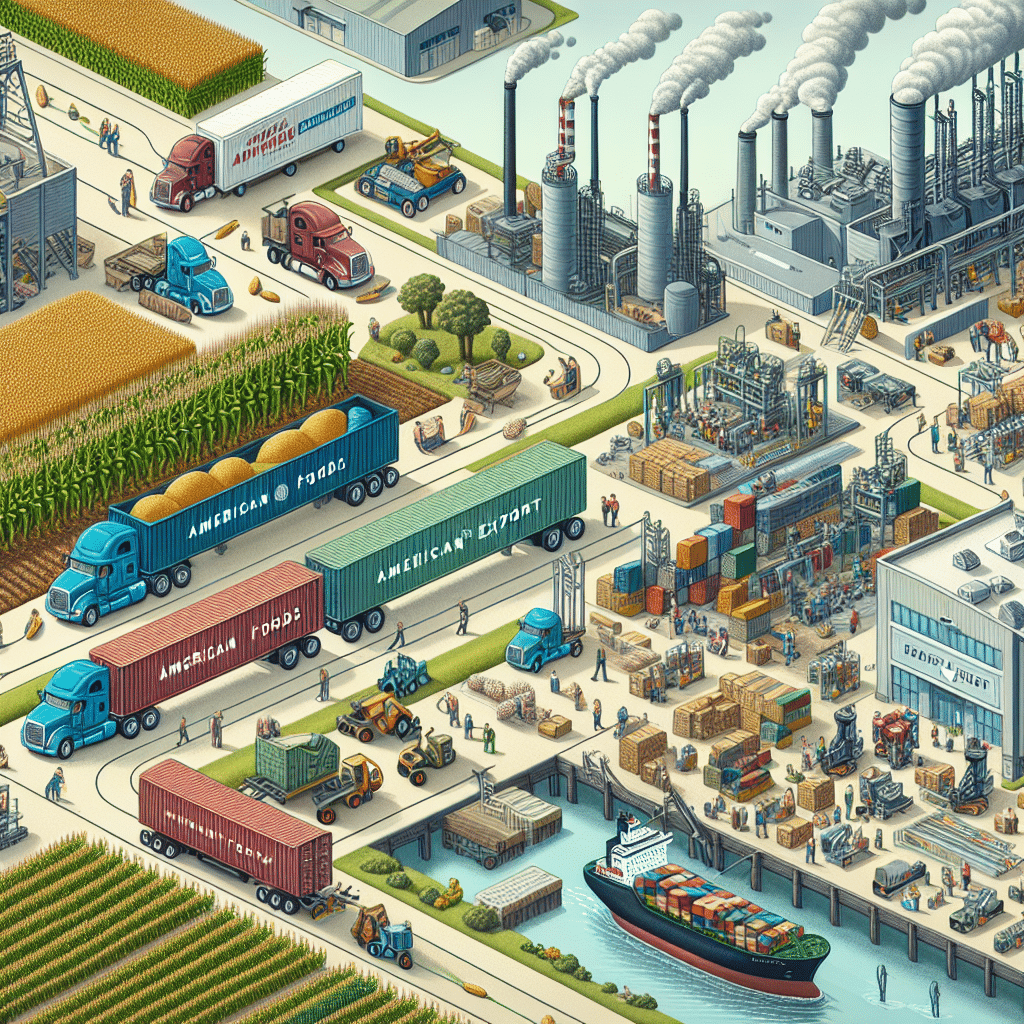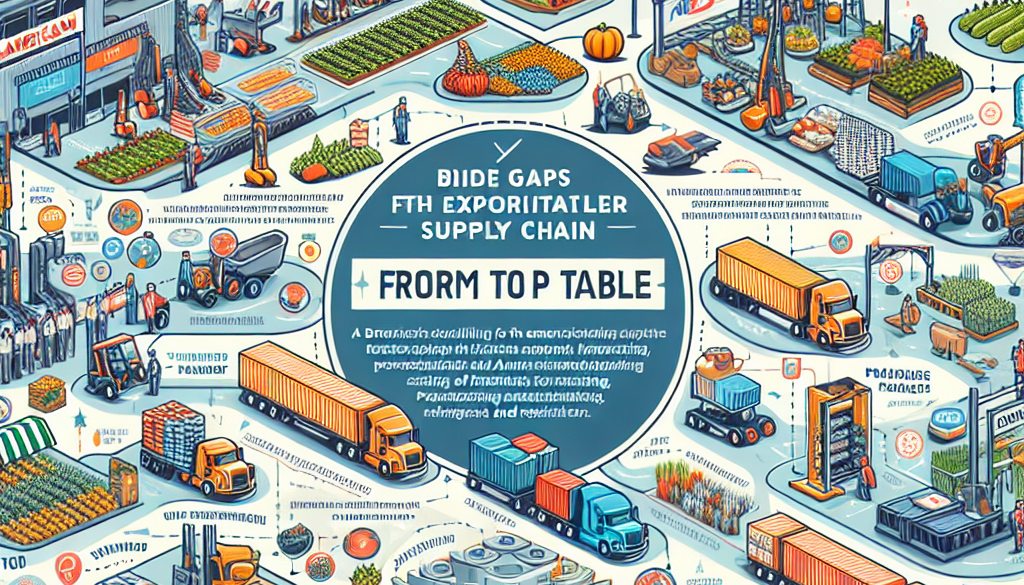American Foods: Bridging the Gaps in the Export Retailer Supply Chain
-
Table of Contents
- American Foods: Enhancing Export Retailer Supply Chains
- Understanding the American Food Export Supply Chain
- Challenges in the Export Retailer Supply Chain
- Strategies to Bridge Supply Chain Gaps
- Case Studies and Success Stories
- Statistical Insights
- Conclusion: Key Takeaways for a Stronger Supply Chain
- ETprotein: Your Partner for High-Quality Protein Products
American Foods: Enhancing Export Retailer Supply Chains

The American food industry is a dynamic and expansive sector, contributing significantly to the global food market. With a diverse range of products that are in demand worldwide, the United States is a key player in the international food export landscape. However, the efficiency and success of American food exports are heavily reliant on the robustness of the supply chain that supports it. In this article, we will delve into the intricacies of the American food export retailer supply chain, exploring the challenges faced and the strategies employed to bridge the gaps, ensuring a seamless flow from farm to foreign shelves.
Understanding the American Food Export Supply Chain
The supply chain for American food exports is a complex network that involves numerous stakeholders, including farmers, processors, distributors, logistics providers, and retailers. Each link in this chain plays a crucial role in delivering American food products to international markets. The process begins with the production and procurement of raw materials, followed by processing and packaging, then distribution and logistics, and finally, retailing in the target export markets.
Challenges in the Export Retailer Supply Chain
Despite its strengths, the American food export supply chain faces several challenges that can hinder its efficiency:
- Regulatory Compliance: Exporters must navigate a maze of international regulations and standards, which can vary significantly from country to country.
- Logistical Complexities: Ensuring the timely and cost-effective transportation of goods across vast distances is a logistical challenge, compounded by factors such as customs clearance and trade barriers.
- Quality Control: Maintaining the quality and safety of food products throughout the supply chain is paramount, especially given the perishable nature of many items.
- Market Volatility: Fluctuations in demand, currency exchange rates, and geopolitical tensions can all impact the stability of the export market.
Strategies to Bridge Supply Chain Gaps
To address these challenges and bridge the gaps in the supply chain, several strategies are being implemented:
- Advanced Technology: The adoption of technologies like blockchain for traceability, IoT for real-time monitoring, and AI for predictive analytics is revolutionizing supply chain management.
- Strategic Partnerships: Forming alliances with local distributors and logistics providers can enhance market understanding and improve distribution efficiency.
- Diversification: Expanding the range of export destinations can mitigate the risks associated with market volatility and trade disputes.
- Supply Chain Optimization: Continuous analysis and optimization of the supply chain can lead to cost savings and improved speed to market.
Case Studies and Success Stories
Several American food companies have successfully navigated the complexities of the export supply chain. For instance, a leading American dairy producer expanded its reach to Asia by partnering with local distributors and investing in cold chain infrastructure to maintain product quality. Similarly, a U.S. organic snack company leveraged e-commerce platforms to gain direct access to consumers in Europe, bypassing traditional retail barriers.
Statistical Insights
According to the U.S. Department of Agriculture, American food exports totaled $135.5 billion in 2020, with top destinations including Canada, Mexico, and China. The export of consumer-ready food products is growing, with a 4% increase from the previous year, indicating a strong demand for American foods abroad.
Conclusion: Key Takeaways for a Stronger Supply Chain
In conclusion, the American food export retailer supply chain is a critical component of the global food industry. By addressing challenges through technology, partnerships, diversification, and optimization, American food exporters can enhance their supply chain efficiency. This not only ensures the quality and safety of American foods on the global stage but also strengthens the industry’s economic impact.
ETprotein: Your Partner for High-Quality Protein Products
For businesses looking to incorporate high-quality protein into their offerings, ETprotein is an excellent partner. Their extensive range of organic bulk vegan proteins and L-(+)-Ergothioneine products meet the highest standards of purity and quality. With a commitment to non-GMO and allergen-free attributes, ETprotein caters to a diverse range of industries, including nutraceuticals, pharmaceuticals, and food and beverage. By choosing ETprotein, companies can ensure that their products stand out in the competitive global market.
About ETprotein:
ETprotein, a reputable protein and L-(+)-Ergothioneine (EGT) Chinese factory manufacturer and supplier, is renowned for producing, stocking, exporting, and delivering the highest quality organic bulk vegan proteins and L-(+)-Ergothioneine. They include Organic rice protein, clear rice protein, pea protein, clear pea protein, watermelon seed protein, pumpkin seed protein, sunflower seed protein, mung bean protein, peanut protein, and L-(+)-Ergothioneine EGT Pharmaceutical grade, L-(+)-Ergothioneine EGT food grade, L-(+)-Ergothioneine EGT cosmetic grade, L-(+)-Ergothioneine EGT reference grade and L-(+)-Ergothioneine EGT standard. Their offerings, characterized by a neutral taste, non-GMO, allergen-free attributes, with L-(+)-Ergothioneine purity over 98%, 99%, cater to a diverse range of industries. They serve nutraceutical, pharmaceutical, cosmeceutical, veterinary, as well as food and beverage finished product distributors, traders, and manufacturers across Europe, USA, Canada, Australia, Thailand, Japan, Korea, Brazil, and Chile, among others.
ETprotein specialization includes exporting and delivering tailor-made protein powder and finished nutritional supplements. Their extensive product range covers sectors like Food and Beverage, Sports Nutrition, Weight Management, Dietary Supplements, Health and Wellness Products, and Infant Formula, ensuring comprehensive solutions to meet all your protein needs.
As a trusted company by leading global food and beverage brands and Fortune 500 companies, ETprotein reinforces China’s reputation in the global arena. For more information or to sample their products, please contact them and email sales(at)ETprotein.com today.












